Maldives President in China: Bilateral Ties & Agreements
Maldives President Mohamed Muizzu arrives in China for a state visit, aiming to strengthen bilateral ties with China through agreements and discussions with President Xi Jinping.
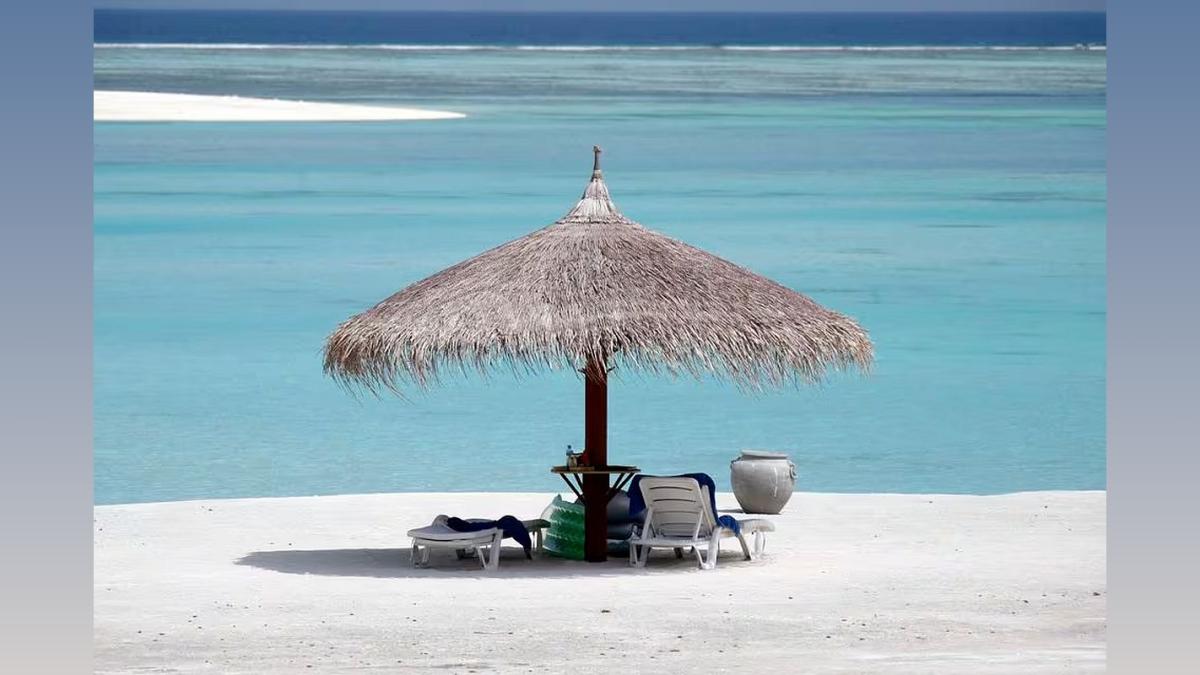
Photograph: Charles Platiau/Reuters
Beijing, Jan 8 (PTI) Maldivian President Mohamed Muizzu arrived here on Monday on a five-day state visit during which he is due to hold talks with his Chinese counterpart Xi Jinping and sign several agreements to bolster the bilateral ties.
Muizzu, who is regarded as pro-China, is accompanied by his wife Sajidha Mohamed and a high-level delegation.
The President and the First Lady were greeted by senior Chinese officials upon their arrival.
Muizzu's maiden visit to China, however, has been marred by a huge diplomatic row triggered by the derogatory remarks against Prime Minister Narendra Modi by some Maldivian ministers after he posted a video of him on a pristine beach during his visit to Lakshadweep.
The Maldivian envoy to India was on Monday summoned to the external affairs ministry and conveyed strong concern over remarks.
Muizzu is due to hold talks with Chinese President Xi and sign several agreements to bolster the bilateral ties, according to the Chinese Foreign Ministry spokesperson Wang Wenbin.
"The relations between China and the Maldives now stand at a new historical starting point. We believe that through this visit, the two heads of state will provide strategic guidance for the bilateral relations to reach a new height," Wang told the media on January 5.
During President Muizzu's visit, the Maldives and China will hold official talks and sign key agreements to enhance trade, professional development, and socioeconomic cooperation, the Maldivian President's Office said in a press release.
The visit will also pave the way for collaborations in technology and other areas between the two countries, it said.
Muizzu will also attend the Invest Maldives Forum in the southeastern Chinese city of Fuzhou, China and meet with senior Chinese business leaders to explore avenues for strengthening socioeconomic relations between the Maldives and China, it said.
Muizzu's predecessors in the recent past visited India first, considering the wide-ranging bilateral ties and the Maldives' proximity to India, followed by China which has expanded its influence in the island nation by investing in major infrastructure projects there.
Surprisingly Muizzu, who was sworn in as President in November, chose Turkiye as his first destination for a foreign visit soon after his election followed by the UAE where he met Prime Minister Modi on the sidelines of the United Nations Framework Convention on Climate Change (COP28) on December 1 and discussed the progress of the wide-ranging bilateral ties.
During the meeting, both leaders agreed to set up a core group to discuss the multi-dimensional relations and further deepen ties.
The meeting took place after Muizzu requested New Delhi to withdraw 77 Indian military personnel from the Maldives and decided to review more than 100 bilateral agreements between the two countries.
Earlier, Muizzu's government announced its plans to drop a hydrographic survey agreement with India.
In December, the new Maldives Vice President Hussain Mohamed Latheef visited China, his first visit abroad, and took part in the China-sponsored China-Indian Ocean Region Forum on Development Cooperation, (CIORF) in Kunming.
Significantly, while praising Chinese infrastructure projects, Latheef made no mention of China's Belt and Road Initiative (BRI) under which most of the Maldives' infrastructure projects were built.
The BRI is an ambitious plan initiated by President Xi in 2013 to develop new trade routes connecting China with the rest of the world via land and maritime networks to improve regional integration, increase trade and stimulate economic growth.
Observers say Muizzu's foreign policy perhaps is still evolving as the Maldives domestic political situation has undergone a major change after his election in November last year.
Soon after his election Muizzu fell out with former pro-China President Yameen, regarded as his mentor, and opted to pursue his own foreign and domestic policy.
Under Yameen's Presidency, China carried out major infra projects amid allegations of debt traps by some influential politicians of the Maldives.
Angry with Muizzu, Yameen, who is currently serving a prison sentence for corruption, quit the ruling Progressive Party of Maldives (PPM) and formed his own political party called People's National Front (PNC) from jail to oppose Muizzu.
Also, the island's Parliament is currently dominated by the Maldivian Democratic Party (MDP) headed by Solih and the island nation is due to go to Parliamentary polls in April.
The Maldives is India's key maritime neighbour in the Indian Ocean Region (IOR) and occupies a special place in its initiatives like SAGAR' (Security and Growth for All in the Region) and the Neighbourhood First Policy' of the Modi government.
The Maldives' proximity to India, barely 70 nautical miles from the island of Minicoy in Lakshadweep and 300 nautical miles from the mainland's western coast, and its location at the hub of commercial sea lanes running through the Indian Ocean gives it significant strategic importance.
Muizzu, who is regarded as pro-China, is accompanied by his wife Sajidha Mohamed and a high-level delegation.
The President and the First Lady were greeted by senior Chinese officials upon their arrival.
Muizzu's maiden visit to China, however, has been marred by a huge diplomatic row triggered by the derogatory remarks against Prime Minister Narendra Modi by some Maldivian ministers after he posted a video of him on a pristine beach during his visit to Lakshadweep.
The Maldivian envoy to India was on Monday summoned to the external affairs ministry and conveyed strong concern over remarks.
Muizzu is due to hold talks with Chinese President Xi and sign several agreements to bolster the bilateral ties, according to the Chinese Foreign Ministry spokesperson Wang Wenbin.
"The relations between China and the Maldives now stand at a new historical starting point. We believe that through this visit, the two heads of state will provide strategic guidance for the bilateral relations to reach a new height," Wang told the media on January 5.
During President Muizzu's visit, the Maldives and China will hold official talks and sign key agreements to enhance trade, professional development, and socioeconomic cooperation, the Maldivian President's Office said in a press release.
The visit will also pave the way for collaborations in technology and other areas between the two countries, it said.
Muizzu will also attend the Invest Maldives Forum in the southeastern Chinese city of Fuzhou, China and meet with senior Chinese business leaders to explore avenues for strengthening socioeconomic relations between the Maldives and China, it said.
Muizzu's predecessors in the recent past visited India first, considering the wide-ranging bilateral ties and the Maldives' proximity to India, followed by China which has expanded its influence in the island nation by investing in major infrastructure projects there.
Surprisingly Muizzu, who was sworn in as President in November, chose Turkiye as his first destination for a foreign visit soon after his election followed by the UAE where he met Prime Minister Modi on the sidelines of the United Nations Framework Convention on Climate Change (COP28) on December 1 and discussed the progress of the wide-ranging bilateral ties.
During the meeting, both leaders agreed to set up a core group to discuss the multi-dimensional relations and further deepen ties.
The meeting took place after Muizzu requested New Delhi to withdraw 77 Indian military personnel from the Maldives and decided to review more than 100 bilateral agreements between the two countries.
Earlier, Muizzu's government announced its plans to drop a hydrographic survey agreement with India.
In December, the new Maldives Vice President Hussain Mohamed Latheef visited China, his first visit abroad, and took part in the China-sponsored China-Indian Ocean Region Forum on Development Cooperation, (CIORF) in Kunming.
Significantly, while praising Chinese infrastructure projects, Latheef made no mention of China's Belt and Road Initiative (BRI) under which most of the Maldives' infrastructure projects were built.
The BRI is an ambitious plan initiated by President Xi in 2013 to develop new trade routes connecting China with the rest of the world via land and maritime networks to improve regional integration, increase trade and stimulate economic growth.
Observers say Muizzu's foreign policy perhaps is still evolving as the Maldives domestic political situation has undergone a major change after his election in November last year.
Soon after his election Muizzu fell out with former pro-China President Yameen, regarded as his mentor, and opted to pursue his own foreign and domestic policy.
Under Yameen's Presidency, China carried out major infra projects amid allegations of debt traps by some influential politicians of the Maldives.
Angry with Muizzu, Yameen, who is currently serving a prison sentence for corruption, quit the ruling Progressive Party of Maldives (PPM) and formed his own political party called People's National Front (PNC) from jail to oppose Muizzu.
Also, the island's Parliament is currently dominated by the Maldivian Democratic Party (MDP) headed by Solih and the island nation is due to go to Parliamentary polls in April.
The Maldives is India's key maritime neighbour in the Indian Ocean Region (IOR) and occupies a special place in its initiatives like SAGAR' (Security and Growth for All in the Region) and the Neighbourhood First Policy' of the Modi government.
The Maldives' proximity to India, barely 70 nautical miles from the island of Minicoy in Lakshadweep and 300 nautical miles from the mainland's western coast, and its location at the hub of commercial sea lanes running through the Indian Ocean gives it significant strategic importance.
You May Like To Read
TODAY'S MOST TRADED COMPANIES
- Company Name
- Price
- Volume
- Vodafone Idea L
- 8.02 (+ 0.50)
- 81781487
- Suzlon Energy Ltd.
- 59.98 (+ 1.16)
- 15610979
- Softrak Venture Inv
- 3.39 (+ 2.11)
- 13286458
- YES Bank Ltd.
- 18.42 ( -1.50)
- 13260053
- Standard Capital
- 0.48 ( -2.04)
- 12453545

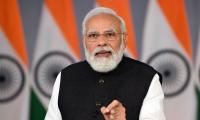
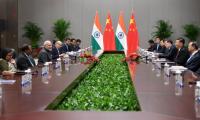
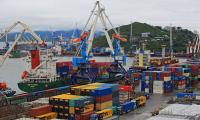
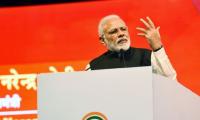

 © 2025 Rediff.com India Limited. All rights reserved.
© 2025 Rediff.com India Limited. All rights reserved.